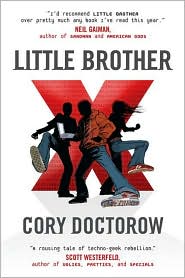 “A rousing tale of techno-geek rebellion,” Scott Westerfield praises. And techno-geek is right.
“A rousing tale of techno-geek rebellion,” Scott Westerfield praises. And techno-geek is right. Before reading Doctorow’s novel, I considered myself fairly competent in the technology department. Two pages into the book, however, my idea of computer nerd was blown out of the water. Compared to Little Brother’s hero, Marcus, my brain is … a turd.
Am I the only one who is completely paranoid about computers after finishing this book? How can you not, after reading passages like: “Botnets are where infected computers spend their afterlives. When you get a worm or a virus, your computer sends a message to a chat channel on IRC—the Internet Relay Chat. That message tells the botmaster—the guy who deployed the worm—that the computer in there is ready to do his bidding.”
.Marcus is the kind of guy who observes, “Knowing how to turn a toilet paper roll and three bucks’ worth of parts into a camera-detector is just good sense.”
He builds his own laptops, for crying out loud. Apparently people actually do this. “If you’ve never programmed a computer, you should. There’s nothing like it in the whole world …. It’s awesome in the truest sense: it can fill you with awe.”
There is a ton of fun, fun, really cool stuff in this book—LARPing, crypto, arphid jamming. However. My brother started reading Little Brother before I’d finished, and was totally getting into it, when I came upon a few scenes that made me swipe the book out of his hands. Why, oh why did Doctorow have to throw in episodes involving the phrase “horn-dog”? Not stuff a 15-year-old needs to be feeding his imagination. I’m sure there are thousands of people who will roll their eyes and say, “Please. You’re such a prude. There are much worse things out there.” Maybe. But why build up to them? Why encourage thoughts about, say, unsnapping a girl’s bra?
Then there’s this theme: “I don’t know how to know who to trust, but I know who not to trust: old people. Our parents. Grown-ups …. Back in the day, they used to say, “Never trust anyone over 30.” I say, “Don’t trust any b…..d over 25!”
I’m sorry, but that so does not swing for me.
The Afterwords and Bibliography, at least, are interesting, and sexless, though, as far as controversial ideas go, they demand vigilant reading, just like the rest of Doctorow’s novel. Written by a security technologist and “the” X-box hacker, Little Brother’s afterwords really made me laugh. Only techno-geeks write lines like, “Hackers are explorers, digital pioneers” and “I was just following a natural impulse, the same impulse that leads to fixing a broken ipod.”
The main theme of Little Brother is obvious. “…no matter how unpredictable the future may be, we don’t win freedom through security systems, cryptology, interrogations and spot searches. We win freedom by having the courage and the conviction to live every day freely and to act as a free society, no matter how great the threats are on the horizon.”
Marcus quotes this passage from the Constitution several times: “…it is the right of the people to alter or abolish [the government], and to institute new government, laying its foundations on such principles, and organizing its powers in such form, as to them shall seem most likely to effect their Safety and Happiness."
"As to them shall seem most likely to effect their Safety and Happiness." I think the deists must have put that in. ;) Pretty open-ended for an age where people stretch every limit. Doctorow banks his entire novel on that section.
Freedom is a powerful word, an important word, packed with meaning and interpreted a bit differently by each set of glasses people's beliefs supply. Doctorow’s techno-geek specs tint his vision a bit too anarchist for me. “So close the book and go,” instructs the security technologist in the first afterword. “The world is full of security systems. Hack one of them.”*
Marcus fights for freedom. Our country’s forefathers fought for liberty. There’s a difference. Contrary to popular belief, we are not the gods of our own destiny. Not everything is about what seems best for us. Proverbs 14:12 is a good reminder: "There is a way which seemeth right unto a man, but the end thereof are the ways of death."
*Context: In order to strengthen security, it must be tested, tweaked, and made stronger. But is that the best mindset to promote among the masses??
2 comments:
If you're pulling the image from my site, could you at least link to me?
--Terry, GameCouch.com
Thanks for the review. I've been hearing lots about this one - I appreciate your perspective.
Post a Comment